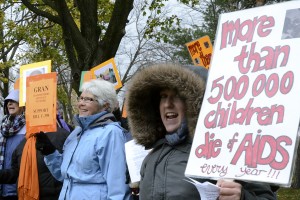GRANnies fight for African aide
By: Keenan Weaver

BELLEVILLE, ON (1/11/12) - Loyalist Student Emily Smith van Beck joins with the rallying grannies at Zwicks Park to show her support for Bill C-398. Photo by Keenan Weaver.
Signs were bouncing, chants were shouted, and hips were shaking as a group of grannies gathered in Belleville for a global cause.
A crowd of over 70 passionate people gathered at West Zwicks Park on November 1, including Loyalist student Laura Rocoski.
“It was pretty exciting getting to dance with them, and chant with them and sing along to all their little songs,” she said.
The local Grandmothers Advocacy Network hosted the rally to raise awareness of Bill C-398, legislation that helps streamline sending medicine to Africa.
The bill is an attempt to reform Canada’s Access to Medicines Regime (CAMR), which would ensure life-saving medicine gets to people who need them most in developing countries.
“Their message is probably the most important thing,” Rocoski said. “I think they got their message across that they are wanting to raise awareness about the problems that are happening and about getting this bill passed.”
As a post-graduate Internernational Support Worker student, this cause was right up her alley. She said the event gave her hope for the cause, as not even the cold wind or risk of rain brought a complaint or frown from the crowd.
Despite the fact that the man in charge of speakers was late, the grannies gathered in the parking lot with smiling faces and high spirits.
“The grannies are definitely a force to be reckoned with,” Rocoski said.
The rally featured guest speakers and a local singer, who considers herself an advocate for women’s global health.
The grannies gathered under the red roof pavilion to listen to Jeanette Arsenault sing her original song, Women of the World.
“It’s my anthem for women,” Arsenault said with a smile. As a professional singer who’s passionate about the cause, her song is for women or men who love women.
Arsenault is passionate about Bill C-398 making its way through Parliament, and thinks GRAN is doing well to help make that happen.
“Everybody believes that it should be a no-brainer, but if others things take up the agenda, or it gets delayed or postponed, if no one keeps raising the alarm, if just gets shifted down lower on the priority list, and this is a priority,” Arsenault said.
The bill has gone through a first reading in Parliament early this year, and has been on the table ever since. A poll was released after an early version of the bill failed saying that 80% of Canadians supported the initiative.
“If they’ve got 80% support in Canada that’s probably because the other 20% don’t know it’s even an issue,” Arsenault said. “I can’t see how anybody would be against it.”
The event was wrapped up with a march up the Zwicks Park hill. The grannies, along with a few city councilors and students, waved their signs proudly as chants of “From our hill to Parliament Hill!” excitedly echoed through the park.
Beth Madole, Coburg resident and part organizer for the rally, was pleased with the turnout and message of the day. She recently collected about 380 signatures on a petition to raise awareness and urge the passing of Bill C-398.
“I think the enthusiasm was there. I find it very moving because we’ve worked really hard on this and to find all these people coming out today and supporting us was really very touching,” Madole said as her eyes glinted with the slightest hint of a tear.
Madole said the next step for GRAN is to work with the local and federal governments to get the bill passed.
“We know there’s still a lot of work to be done, but I think we’ve got a lot of other associations behind us,” she said.
According to a GRAN brochure, the bill is also endorsed be the Canadian HIV/AIDS Legal Network, the CAMR Coalition, Unicef, and more than 200 Canadian non-government organizations.
“It’s a huge movement this time and so we’re really hopeful that it will pass second reading, go to committee and get all the way through this time,” Madole said.
The passing of Bill C-398 would mean easier access to medications to treat HIV/AIDS, tuberculosis, malaria and many other ailments. This medicine would be used to help the grandmothers that take in orphans in third-world countries, and stop the spread of diseases from pregnant women to their children.
 Print This Post
Print This Post






